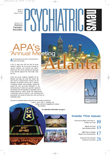The APA Council on Global Psychiatry is collaborating with the World Psychiatric Association's (WPA) Conflict Management and Conflict Resolution Section to present a special session at APA's annual meeting in Atlanta addressing “Global Disasters: Psychiatric Medicine and Public Health Challenges.”
The session, organized after the devastation wrought by the Indian Ocean tsunami in December 2004, will be held at the Carter Center in Atlanta on Tuesday, May 24, from 6 p.m. to 8:30 p.m.
“In view of the South-Asia and East-Africa tragedy and trauma,” noted Eliot Sorel, M.D., chair of the WPA Conflict Management and Resolution Section, “with the unimaginable loss of Asian, African, and European lives, this session represents but a modest effort to contribute to the survivors' healing.”
Sorel will co-chair the session with Rodrigo Muñoz, M.D., former APA president and current chair of the Council on Global Psychiatry.
The pair have invited Srinivasa Murthy, M.D., of the World Health Organization's Eastern Mediterranean Office; Paramshevara Deva, M.D., the WPA zonal representative for South Asia; Frank Njenga, M.D., president of the Kenya Psychiatric Association; and Lennart Levi, M.D., chair of the WPA Occupational Psychiatry Section, to participate in the panel. Joining the panel as discussants will be Mordechai Benyakar, M.D., chair of the WPA Section on Mental Health and Disasters, and Anthony Ng, M.D., chair of the APA Committee on Psychiatric Dimensions of Disasters.
The session will address the formulation of a consensus statement and development of a template for responding to large-scale disasters by categorizing the specific response by the severity, complexity, and location of events. Responses to regional, national, and global disasters will be discussed, with a focus on the challenges and opportunities inherent in each of these.
The panel, Sorel said, will also attempt to delineate assets that could be mobilized in response to disasters, as well as potential liabilities, and will discuss lessons learned from past disasters. Working closely with other professional organizations and with governmental, nongovernmental, and corporate organizations, the panel will explore best practices for disaster response and identify potential, virtual, and actual partners with which to team in exploring current and future directions for disaster response.
Finally, the session will explore the development of plans of action for short-, mid-, and long-term public health solutions regarding psychosocial distress and psychiatric disorders associated with disasters, while being mindful, Sorel noted, of the need for “cultural and spiritual specificity.” ▪
